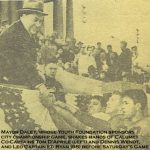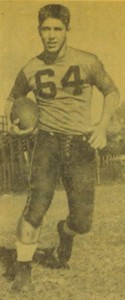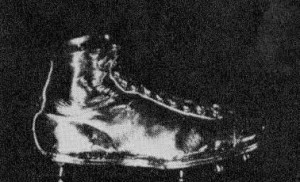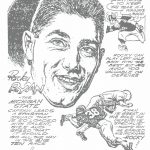Interviewed and Written by Patrick Mc Gavin 5/08, Edited by Larry Lynch ’75
EDWARD J. RYAN ’57
Talent + Athletic Valor = An Exceptional Life for this Leo Man
Shakespeare’s famous declaration, in As You Like It, that “All the world’s a stage,” the men and women merely players, imagines a world, an existence, where we all play part or take on an identity for which we are ideally and temperamentally suited. Sometimes a man of exceptional determination and drive finds that one thing.
Ed Ryan’s determination and drive was always to excel at playing football.
The second of four children, all boys, born to two Chicago police officers, Mr. Ryan grew up on the South Side, in the area around Ogden Park , at 64th and Loomis. It was a poetic, even tribal world of toughness, drive and determination. “I grew up knowing nothing but Irish Catholic people,” he says. His paternal grandfather was a first-generation Irish émigré and streetcar operator.
He was shaped by strong beliefs in family, neighborhood, religion and work. He also went against the grain, a headstrong, tough kid who was desperate to make his mark.
Mr. Ryan’s sense of purpose, his identity, came from playing football. He had no other hobbies to speak of. With his childhood friends, they’d play sandlot ball at Ogden Park until the darkness made it all but impossible to go on. He played organized ball for the first time in the fifth grade. Almost twenty years later, he achieved national recognition, All-American status and earned a living playing the game professionally.
Football is perhaps the driving metaphor of his life; it is just part of his story. Rather than surrender to the game, he utilized it for everything it was worth. His sports success was paralleled by a highly successful business and corporate career, where the entrepreneurial discipline and his deeply honed sense of competition, drive and success profoundly influenced the balance of his life and work.
It was his four-years at Leo High, just after the turn of the mid-century, that convinced Mr. Ryan that his dreams and goals were attainable, and the school helped nurture and develop his individual consciousness and make him aware of life beyond his immediate grasp.
“All of my brothers went to Leo,” Mr. Ryan says. “My older brother quit school and joined the Marines during the Korean conflict. I graduated grammar school in 1953.” Most of his grammar school classmates wound up at St. Rita or Mount Carmel. Many others attended local public schools, like Harper, Tilden or Chicago Vocational. The first time Mr. Ryan saw the Leo campus, was when he played at a grammar school Catholic League basketball tournament at the school’s game gym. It held an immediate cachet for him. “This friend of mine, Bill Harvey, and I went to Leo, I remember going up there on a Saturday morning, in 1953, and taking the entrance exam.
“We were accepted. I went to Leo and I really did not know anybody.”
BEGINNINGS
 “I’d have to say Leo is the basic foundation in my life. In other words, I was made aware of the fact that there was more to life than hanging around the corner and being part of a group of guys. I’d say that was the beginning of seeing what life was like in the rest of the world.”
“I’d have to say Leo is the basic foundation in my life. In other words, I was made aware of the fact that there was more to life than hanging around the corner and being part of a group of guys. I’d say that was the beginning of seeing what life was like in the rest of the world.”
The school instilled a code of conduct, a personal discipline. Even so, Mr. Ryan still maintained his flair for the dramatic. He turned the act of getting to school into a thrill and adventure. “We’d get carfare and walk across Ogden Park to 64th and Racine, and then we’d hitchhike down Racine and then walk over to Sangamon. Very seldom did we take the streetcar.” Those were the kind of small acts of defiance and free will those young men like Mr. Ryan performed just to remind them they were alive.
Part of his maturity was realizing that life was not just about living in the moment, hanging out and having fun but finding direction and personal meaning. “Leo was the stimulus and the driving force to keep going, the idea that high school was not the end of something.
“A lot of guys I knew in grammar school, they’d go to high school for a couple of years, drop out, go into the [military] service, get out and get a job as a laborer, a draftsman, a carpenter. At Leo, we were taught that you just don’t just stop after high school. You have to go on. You could not have asked for better as far as being prepared for college: the discipline, you didn’t have any problem maintaining study habits, going to class and doing your work. In college, you’re pretty much on your own; you have a free hand so to speak.
He was a bright, industrious kid, and the academic curriculum at Leo caught his attention. Latin was mandatory, as was four years of English, economics and civics. “They emphasized double classes in English, literature and composition, grammar, the ability to speak and write properly and know how to express yourself,” he says.
He was a good-sized kid, about 5-feet, nine-inches tall and he weighed about 160 pounds. He was gifted athletically. He could run like the wind. At the time trials, he ran faster than everybody. He tried out for freshman football, and immediately he made his mark. Being a South Sider with an ingrained sense of duty and responsibility, Mr. Ryan began working at an early age. “Our family had some connections, and there was a gentleman, John Mahoney, who was a major beer distributor. I got a job working in the warehouse unloading boxcars and semi trucks going out on routes. I did that until I was a senior [at Leo],” he says.
MAKING OF A HIGH SCHOOL STAR
After demonstrating unusual prowess as a freshman, Mr. Ryan made the unheard of transition to the varsity as a sophomore. The team’s coach, Jim Arneberg, was a famed Leo graduate, a dominant starting lineman on the 1941 Prep Bowl championship team that destroyed Tilden 46-13 in front of nearly 100,000 people at Soldier Field. Coach Arneberg was a former Marine who believed in teamwork, selflessness and honor. Everything was subordinate to the team.
graduate, a dominant starting lineman on the 1941 Prep Bowl championship team that destroyed Tilden 46-13 in front of nearly 100,000 people at Soldier Field. Coach Arneberg was a former Marine who believed in teamwork, selflessness and honor. Everything was subordinate to the team.
That made Mr. Ryan’s rise all the more impressive. Mr. Ryan lived outside the school’s impressive history. A right halfback, he had a knack for making plays, either using his speed to get outside or his strength and power to break tackles or elude the rush. At Leo, he got his first significant coaching on the intricacies of the game. The Lions were a power rush team that dominated games by running the ball and playing tough defense.
Within the rigorous academic framework of Leo, football was a very serious subject. The games were played on Sundays, like the professional teams, the Chicago Bears and Chicago Cardinals. The team drilled and practiced fiercely Monday through Friday. They attended a special Saturday Mass in preparation for the big game. Regular season games routinely drew five-figure crowds. Mr. Ryan recalls playing virtually year round. “On Saturday, you’d draw your equipment,” he says. The equipment was closer to armor, a protective sheath that turned players into warriors. The game was slower than today, more physical and the risk of injury was pronounced.
 As a running back, the focal point of his team’s offensive attack, Mr. Ryan was subject to almost constant physical abuse. He played through injuries, a pulled hamstring, busted ribs. During one game, the pain Mr. Ryan experienced was so unbearable that he nearly collapsed. “The chant in the stadium was: ‘Take out Ryan, the poor guy’s dying.’” In one of the most dramatic games his senior year, he scored the game-clinching touchdown on a short pass play that he turned into a long catch and run against Fenwick. What was mostly unknown was that he played the game with a separated shoulder, and he caught the ball with his right arm tied to his body. Against Mount Carmel, Leo’s greatest rival, Mr. Ryan scored four touchdowns.
As a running back, the focal point of his team’s offensive attack, Mr. Ryan was subject to almost constant physical abuse. He played through injuries, a pulled hamstring, busted ribs. During one game, the pain Mr. Ryan experienced was so unbearable that he nearly collapsed. “The chant in the stadium was: ‘Take out Ryan, the poor guy’s dying.’” In one of the most dramatic games his senior year, he scored the game-clinching touchdown on a short pass play that he turned into a long catch and run against Fenwick. What was mostly unknown was that he played the game with a separated shoulder, and he caught the ball with his right arm tied to his body. Against Mount Carmel, Leo’s greatest rival, Mr. Ryan scored four touchdowns.
He was named the Catholic League player of the year and the Chicago Sun-Times offensive player of the year. With his friend, Rich Boyle, the fullback who ran mostly inside, he formed a punishing two-way rushing attack. They transformed the 1956 Leo squad into one of greatest in school history. They won eleven of their twelve games. After defeating St. George and Fenwick to capture the Catholic League crown, the Lions squared off against Public League power Calumet in the Prep Bowl. The two runners spearheaded an attack that totaled more than 300 yards, propelling the Lions over Calumet 12-0 at Soldier Field before a crowd of approximately 67,000.
“Our senior prom was at the Merchandise Mart, at the M & M Club. Somebody was a friend with somebody from the [popular night club] Chez Paris. We saw Nat King Cole. At Leo, everything was big time.”
Football was a great deal more than just a game. It was a means to further his education. By the end of the 1950s, the post-war economic boom began to fade and a recession set in. “I worked until I was a senior, and suddenly all of these guys were getting laid off. There were no jobs,” Mr. Ryan says. COLLEGE ALL-AMERICAN
Fielding several athletic scholarships, Mr. Ryan originally committed to play football and continue his education at Notre Dame. The legendary Indiana school was the most famous college football program in the country. Their heritage, power and prestige superseded any of the professional programs. Mr. Ryan was a high school All-American, but he discovered upon enrolling at the school, there were five or six others the school had recruited. Like Mr. Ryan, they were young, talented and eager to make their mark. Freshmen were not eligible to play varsity competition. Feeling somewhat adrift, Mr. Ryan left Notre Dame just before the conclusion of his first semester.
Football, the famous coach and philosopher Vince Lombardi was fond of saying, is a lot of like life. Serendipity and luck all play a role. Mr. Ryan quickly settled on a new school, Michigan State University. The coach was the legendary Duffy Daugherty. “Michigan State happened to be on quarters. They were starting a spring quarter in 1958. I started there in 1958 and worked out with the varsity. I went through the summer. I played freshman ball again,” he says.
Michigan State University. The coach was the legendary Duffy Daugherty. “Michigan State happened to be on quarters. They were starting a spring quarter in 1958. I started there in 1958 and worked out with the varsity. I went through the summer. I played freshman ball again,” he says.
“At Leo, I was the first person in my family to graduate. This is just the beginning. Now, you have to get serious. Now, you have to go to college. There were no questions about it. The belief at Leo was that you are going to college. I never really had time to smell the flowers. I was at Notre Dame. They had five other guys who were high school All-Americans,” he says.
College football was single platoon, meaning starters played both ways. Mr. Ryan cracked the line up as a sophomore and performed admirably. His toughness and speed set him apart. At the start of his junior year, he was switched to left halfback. The game was violent and physical. The hardest part, Mr. Ryan concedes, was how to play the game in such constant pain.
“In the third game, against Iowa, I was not playing much on defense. Every school had a rover, a monster or a red dog. I never practiced for the position. Sometimes I was a linebacker, other times a defensive back. I was making a lot of tackles. By the end of the season, we were playing Purdue. I have the position down to a science.
“We were in West Lafayette and holding onto a lead. Right at the end of the game, they were threatening to score. I was perspiring. Michigan State was one of the first schools to use facemasks. I broke my helmet, broke my nose and I was hemorrhaging. I talked them into flying back with the team. I was in a hospital about three days. They were worried about the swelling. I came out Wednesday. The doctor said I could get out, but he warned me about eating something solid. I tried eating a hamburger. All of my teeth were falling out. They called two brothers at the country club who were dentists and they packed me up.
“We had Northwestern and University of Detroit left. I thought I was done for the season. After the group work finished off, the coach said, ‘I’m going to have the equipment manager make a helmet for you.’
“On Thursday, the coach gave me the helmet and I could hardly see out of it. He said, ‘I don’t think you’ll break this one. I started against Northwestern. They had a good team, but not a lot of depth. [Ara] Parseghian was the coach. It was a beautiful day, sunny, cool, right on the lake. I tackled a guy, I must have crimped the extension [of the helmet], [because] my head felt like it was in vice. They had to cut the helmet off and I’m bleeding. At halftime, we were losing 18-0. Duffy doesn’t want to talk to the team. I figured I was done.
“I felt an arm around me. It was Duffy. ‘You know, Rocky, we got that helmet for you.’ I went back into the game. I intercepted two or three passes in the second half and we beat them 21-18.
Despite being drafted professionally, Mr. Ryan elected to return for his senior year at Michigan State. He played brilliantly and earned All-American honors. He was selected to play in several prestigious postseason games: The Blue-Gray game and the Senior Bowl.
In the spring of 1962, he was drafted simultaneously by three professional leagues: by the Bears in the National Football League, the Buffalo Bills in the American Football League and the Toronto Argonauts of the Canadian Football League. After George Halas, the Bears’ quixotic coach, owner and general manger, refused to make much of a financial incentive to play for the Bears, Mr. Ryan settled on playing in Canada. He played three years with the Argonauts. The money was simply too good to turn down. “I made 16,000 the first year, and I made another $10,000 on a [signing] bonus contract,” he says.
“The thing was, being a South Sider, I was more of a Cardinals fan than a Bears fan,” he says.
MORE THAN JUST A FOOTBALL PLAYER
Mr. Ryan always bristled at the cultural perceptions of football players as not being intellectually skilled. For all of his football accomplishments, Mr. Ryan was proudest of his selection into Excalibur, an exclusive Michigan State fraternity that honored the ten best male students.
At Michigan State, Mr. Ryan studied pre-law with an emphasis on business and criminal justice. Mr. Ryan intended to become a lawyer. At Michigan State, he worked in the Oldsmobile division of General Motors. Interested in pursuing labor relations, the intermediary between management and labor, Mr. Ryan apprenticed as a generation supervisor in the production of automobiles. “They would not hire anybody unless they had a background and familiarity with the plant,” he says. “I went to Detroit, but I was based out of Lansing. They wanted me to stay in manufacturing. The deal was I wanted to get into labor relations. I knew how to build cars. I worked in the frame area, engine transmission assembly area; I worked the front ends.
He played his last year of football in 1964. Mr. Ryan became a principal in a GM supplier, Clark Equipment, rising to the position of director of safety and security, based in Buchanan, Michigan, on the Indiana and Michigan border. “A group of us bought a division of Clark, called Tyler, the second largest manufacturer of commercial refrigeration. I was a senior vice president and VP of human resources,” he says. He remained in that position for 25 years until his retirement, in 1988.
 His wife of 30 years, Maureen, with whom he had a daughter, Laura, passed away. Mr. Ryan is now remarried and splits his time between Buchanan and Ft. Lauderdale, where he manages several real estate concerns.
His wife of 30 years, Maureen, with whom he had a daughter, Laura, passed away. Mr. Ryan is now remarried and splits his time between Buchanan and Ft. Lauderdale, where he manages several real estate concerns.
His life in sports presaged the drive and determination that transformed him into a successful businessman. Having lived in many parts of the country and traveled pretty much every corner of the world, Mr. Ryan remains firmly rooted in the South Side. He privileges his time at Leo.
In becoming part of a group, a community, a moral foundation, Leo helped Ed Ryan become his own man. “I was always more interested in proving what I could do myself,” he says.
I WENT TO DELASALLE IN 1956 ,ALOT OF MY FRIENDS WENT TO LEO .EVEN GOING TO ANOTHER SCHOOL ,ED RYAN WAS LIKE A MENTER TO A LOT OF SOUTHSIDE KIDS TRU GRIT GOD BLESS HIM..
I went to Michigan State and met Ed and his wife Maureen in married housing. I have lost contact with him and would appreciate it if anyone knows his present address and phone number too please forward it to me. Many thanks and God Bless